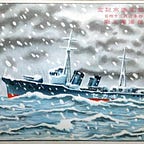Tatsuru Uchida on Russia and Japan
I was asked to speak at a citizens’ meeting in Osaka on the curious topic of “Ukraine and Casinos”. After wondering how I could finish this “two-topic conversation,” I decided to talk about my hypothesis that there is a common pattern in the decline of Russia and Japan.
Russia has not been an economic powerhouse since the beginning: its GDP ranks 11th in the world, below Italy, Canada, and South Korea, 7% of the U.S. GDP, and one-third of Japan’s GDP. Its per capita GDP ranks 66th in the world. It is below former satellite countries such as Hungary, Poland, and Romania. The former Soviet Union was a world leader in physics, but since the collapse of the Soviet Union, there have been five Nobel Prize winners. Peace Prize winner Dmitry Muratov is an anti-authority media journalist, and of the four physics prize winners, one lives in the United States and one in the United Kingdom. The Russian system no longer appears to have the cultural productivity to generate intellectual innovation.
Although Japan is still ahead of Russia in terms of external figures, both countries share the same sense of social stagnation associated with a long-term downward trend.
The system has not been reformed, power has accumulated exclusively in a handful of groups, only “yes men” can rise in the ranks, those who admonish their superiors are reassigned to the left, “oligarchs” and “rent seekers” have amassed huge wealth by converting public property into private property, while the common people are suffering under poor employment conditions…the list goes on and on. There are many similarities.
When former Prime Minister Shinzo Abe said to President Putin with a broad smile, “Vladimir, you and I see the same future,” in hindsight, he was not paying lip service to the fact that he was talking to Putin. Indeed, the future that these two powerful men saw was quite similar. It is that “there is no future.”
What Russia and Japan have in common is the inability to present “what the future should look like. In both countries, the leaders speak exclusively of regrets, nostalgia, and remorse (“It’s his fault we got into this mess,” “The old days were good,” “I should have done that back then,” and the like are repeated).
The anger and sadness may be subjectively sincere. However, no matter how sincere it may be to the individual, a message that does not embrace the future will not resonate in the hearts of others. The message is, “Oh, I see. That’s a big deal, isn’t it?”
I call it “the future” because there are not many people who would say such a thing, but what I call “the future” is the “future” that is hoped for based on the strong desire that “no one will ever again experience the kind of suffering and sorrow that we have experienced.”
Anyone who has experienced pain and suffering, be it from war, poverty, or epidemics, will think, “I never want to experience this kind of suffering again.” It is natural. But not many people take it a step further and say, “I don’t want anyone else to go through the same suffering, not just me.” However, only the future that those who have such a strong wish aim for will touch the hearts of others. Only such a “vision of the future” can have the power to transform reality, transcending differences in race, religion, and language.
Both the Russians and the Japanese have been deeply scarred by the traumatic experience of war. No one would deny that. But the guiding principle they drew from it was, at best, a regret that they would never feel that way again. Neither country could translate their painful experiences into a prayer that “no one in the world will ever again experience the pain and suffering that we did. Without such a prayer, I don’t think we are “offering” to those who were hurt and suffered in the past, but there have always been only a few people who think this way in Russia and Japan, and I doubt that there will be a majority in the future.
Therefore, I think there is unfortunately “no future” for both countries. I think this is very common sense, but as far as I can tell from the media, I have not seen anyone say the same thing, so I have decided to speak just for myself.
